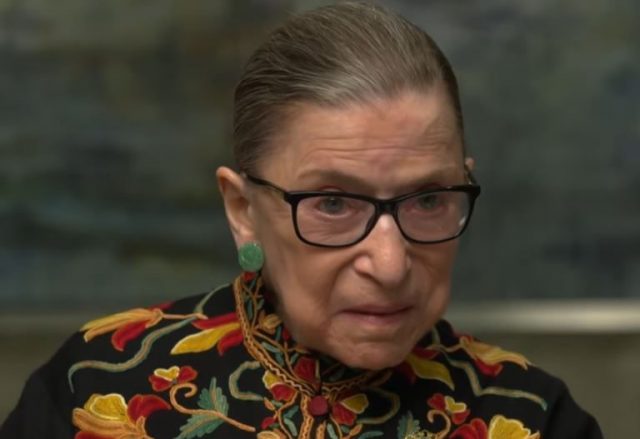
Yesterday, during oral arguments inside the Supreme Court Building, Justice Ruth Bader Ginsburg shut down Justice Neil Gorsuch after he attempted to lecture the rest of the room on his view of the U.S. Constitution.
The arguments in question concerned Gill v. Whitford, the partisan redistricting case that could potentially spell the end of gerrymandering in the United States. Attorney Paul M. Smith, arguing for the Court to take a proactive role in putting a stop to partisan redistricting, had been asked by Ginsburg to explain how gerrymandering had essentially created one-party rule in some states.
As Smith explained, Gorsuch tripped him up by bringing into play certain Constitutional minutiae–the republican (small-R) form of government clause–which derailed the explanation into an opportunity for Gorsuch to claim Smith was making an argument different from the argument that was actually being made. Gorsuch said, “Isn’t that — isn’t that exactly what you’re trying to do, though?” To which Smith replied, “No.”
They went back and forth again–getting nowhere–and then Gorsuch cleared his throat, saying: “For that matter, maybe we can just for a second talk about the arcane matter, the Constitution.” No one interjected, so the newly-minted Justice went on (and on):
And where exactly do we get authority to revise state legislative lines? When — when the Constitution authorizes the federal government to step in on state — state legislative matters, it’s pretty clear. If you look at the Fifteenth Amendment, you look at the Nineteenth Amendment, the Twenty-Sixth Amendment, and even the Fourteenth Amendment, Section 2, says Congress has the power, when state legislators don’t provide the right to vote equally, to dilute congressional representation. Aren’t those all textual indications in the Constitution itself that maybe we ought to be cautious about stepping in here?
For those not up on the obscure legalese and textualist dogmatics employed in the above quote, what Gorsuch was trying to communicate here is a disdain for using the courts to correct an alleged wrong when the Constitution theoretically provides avenues for redress via the same politicians who have a vested interest in making sure those alleged wrongs are never actually corrected.
Smith dispensed with Gorsuch’s claim, noting, “Well, I don’t think there’s anything unusual about using the First Amendment and the Fourteenth Amendment to regulate the abusive management of state elections by state government. That’s what the Court has been doing.”
Gorsuch’s line of thought is nothing new for either Gorsuch (to say) or Ginsburg (to hear), nor was Smith’s accurate recounting of how the Supreme Court has historically stepped in where either the States or the Congress were unwilling or unable to do so, but something about the circumstances caused the octogenarian liberal justice to reach for the long knives of a brutal takedown. She said:
Where did one-person/one-vote come from?
This was, of course, a reference to Supreme Court precedent–the concept is not enshrined in the U.S. Constitution via the document itself, rather it was read into U.S. Constitutional law by Chief Justice Earl Warren via the case of Reynolds v. Sims. And this, to be sure, is a complete renunciation of Gorsuch’s Constitutional worldview.
[image via screengrab]